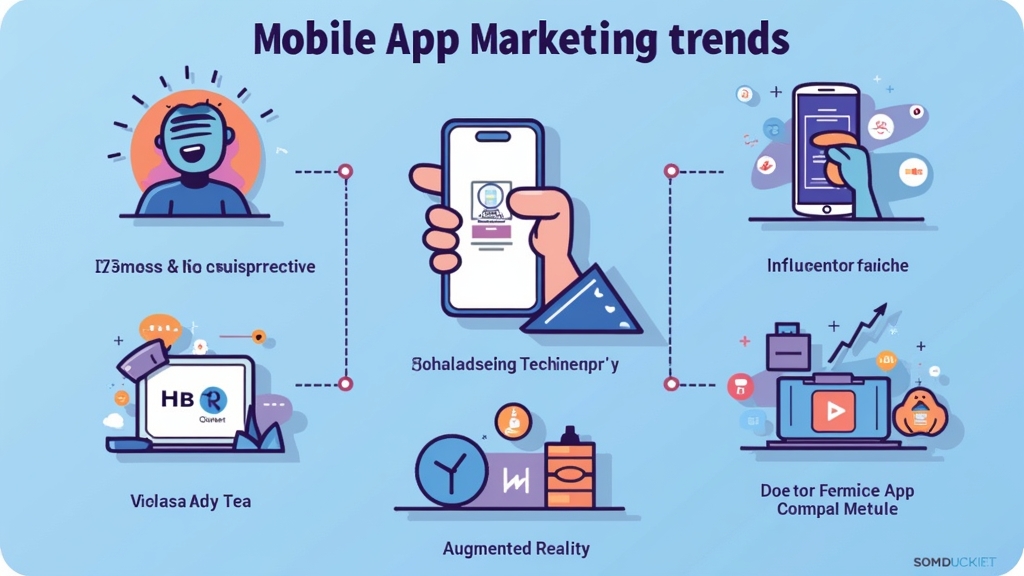Mobile App Marketing Trends: Navigating the Future of App Promotion
Introduction
In today’s digital world, mobile apps are essential for businesses. With millions of apps available, standing out can be challenging. That’s where mobile app marketing comes into play. It involves strategies to promote your app and attract users effectively. Staying updated on the latest trends in this field is crucial for success. By understanding these trends, you can enhance your app’s visibility and user engagement, ensuring it thrives in a competitive market.
The Rise of Artificial Intelligence in App Marketing
Artificial intelligence (AI) is transforming how apps are marketed. One significant trend is AI-powered personalization strategies. These tools analyze user data to create tailored experiences that resonate with individual preferences. For example, an e-commerce app might recommend products based on past purchases or browsing history.
Another exciting development is the use of chatbots for customer engagement. Chatbots provide instant responses to user inquiries, improving satisfaction and retention rates. They can assist users 24/7, guiding them through processes like account setup or troubleshooting issues without human intervention.
Influencer Marketing in Mobile Apps
Influencer marketing has gained traction as a powerful tool for promoting mobile apps. Building relationships with influencers allows you to tap into their audience and gain credibility quickly. When influencers share their positive experiences with your app, it can lead to increased downloads and user trust.
Success stories abound in this arena; for instance, a fitness app partnered with popular fitness influencers who showcased workouts using the app’s features on social media platforms. This strategy not only boosted downloads but also created a community around the brand, enhancing user loyalty.
The Growing Importance of User Experience (UX)
User experience (UX) plays a vital role in mobile app success. Design trends that enhance UX include intuitive navigation and visually appealing interfaces that make interactions seamless and enjoyable for users. A well-designed app encourages users to explore its features rather than abandon it out of frustration.
Measuring UX impact on retention rates is essential too; studies show that apps with superior UX have higher retention rates compared to those with poor design choices. By focusing on creating an engaging experience from the start, you increase the chances of retaining users long-term.
Social Media Strategies for Mobile Apps
Social media platforms are invaluable tools for promoting mobile apps effectively. Best platforms include Instagram, TikTok, and Facebook due to their vast reach among potential users. Each platform offers unique opportunities to showcase your app creatively through ads or organic posts.
Creating shareable content is key; think about fun challenges or engaging visuals that encourage sharing among friends and followers. This approach not only increases visibility but also fosters community engagement around your brand—essential elements for successful mobile app marketing.
Leveraging Data Analytics for Targeted Marketing
Data analytics provides insights into user behavior crucial for targeted marketing efforts. Understanding how users interact with your app helps identify areas needing improvement or features they love most—allowing you to tailor future updates accordingly.
Tools like Google Analytics or Mixpanel offer effective data analysis capabilities by tracking metrics such as session duration and conversion rates within your app environment—enabling informed decisions based on real-time data rather than assumptions about what works best.
The Impact of Augmented Reality (AR) and Virtual Reality (VR)
Augmented reality (AR) and virtual reality (VR) are emerging technologies making waves in mobile app marketing campaigns today! Innovative AR/VR campaigns allow brands to create immersive experiences that captivate audiences while showcasing product features interactively—for example; furniture retailers using AR so customers can visualize items within their homes before purchasing!
The future potential of AR/VR in app marketing looks promising as technology advances further! As more devices become compatible with these technologies over time—expect even greater integration possibilities leading toward enhanced consumer experiences across various industries!
Conclusion
To recap key trends discussed here: artificial intelligence enhances personalization efforts while influencer partnerships build trust among target audiences! Prioritizing user experience ensures higher retention rates alongside leveraging social media strategies amplifying reach significantly! Finally utilizing data analytics empowers marketers toward making informed decisions based upon actual usage patterns observed within applications themselves!
As we look ahead at what lies beyond today’s landscape—it’s clear adapting swiftly will remain paramount when navigating this ever-evolving realm known as mobile application promotion!
📢 Explore More: Continue Your Journey!
If this article helped you understand current trends better, check out “Effective Strategies for Boosting App Downloads”! It covers innovative tactics that help you maximize visibility while attracting more users effectively.














![NEEWER 55W 18"/45cm Ring Light Kit [New Version], 5600K Dimmable ...](https://m.media-amazon.com/images/I/414QLqvZWLL._AC_.jpg)








